(The alternate title for this post is “The Plover Pronunciation Poll Revisited.”)
Often, the answer to one question leads to several more questions. Once a nascent naturalist answers the question as to what exactly a plover is, the very next one is just how to pronounce the confounded bird’s name.
Pluhv-er or ploh-ver… all I can tell you is the jury is still out on this one.
The question of whether the word ‘plover’ is spoken with a short or a long ‘O’ reminds me of a trip Sara and I took three years ago to the Connecticut Audubon Coastal Center, as fine a place to spy charadriids as one could want. Extremely new to the avocation of avian observation, we had no business trying to identify shorebirds, even in August. We were fortunate that the Audubon Center attracted enough skilled practitioners willing to do the heavy lifting for us. Two of the most interesting birders seemed to be related, but their exact connection was unclear. I imagined that the pair was a teenaged boy, perhaps 15 or so, spending time with his favorite aunt. The two, this older woman possessed of a cosmopolitan air and a British accent birding with a young man, superficially awkward yet emboldened by his companion’s respect, obviously had a deep affection for one another. That’s what made their banter so memorable.
In the midst of putting names to the barely distinguishable shorebird faces in the teeming mass below, they picked out Black-bellied and Semipalmated Plovers. The youth pegged these birds as plovers with a long ‘O’, which prompted his companion to teasingly dissent.
“Do you call your lover your ‘loh-ver’?”
In response, he asked, “Do you visit the White Cliffs of ‘Duh-ver’?”
Back and forth they quipped but never achieved consensus. The two might have gotten us on some of our first plovers, but when it came to vocalizing the names of our new birds, they were of little help. In this, they are hardly alone, as even dictionaries acknowledge both pronunciations without favor.
I tend towards the short ‘O’ rhyming with ‘lover’. I’ve wondered, though, if this is the norm, either here in the U.S. or internationally. To that end, I invited my readers, an educated and savvy lot, to weigh in on this important matter by taking my Plover Pronunciation Poll. The results of this August 2006 survey were intriguing:

So out of 80 respondents, most of them likely to be better acquainted with the average man on the street, the slim majority selected pluhv-er over ploh-ver. More fascinating than the results were the comments:
Tom Andersen of Sphere has conducted his own research into this issue. Unfortunately, his inquiries were a response to those callous individuals who would rather see a bird species extirpated than give up the right to sprawl and drive all over the beach:
Suffice it to say that those who would prefer not to see piping plovers on the beach have their preferences. Some sing a song, to Paul Simon’s tune, called ’50 Ways to Kill a Plover,’ and others sing one called ‘I’m Driving Over a Piping Plover,’ to the tune of ‘I’m Looking Over a Four-Leaf Clover.’ If the piping plover haters ever come to an agreement on pronunciation, we bird lovers should adopt the other one.
Robin Andrea of Dharma Bums feels the same:
I was listening to Ed Schultz on Air America yesterday. He had just returned from a visit to a Virginia beach, where he had been informed that there were places he couldn’t walk because it was protected plover habitat. Yikes. You should have heard him go off about that. What is it about protecting birds that puts people in such a bad mood? It’s not like humans don’t have a zillion other beaches to walk as far as they’d like.
I pronounce it plover, it rhymes with lover, but I’m willing to change it once the haters have adopted their pronunciation.
Deb of Sand Creek Almanac tried to move the poll into another direction entirely:
Over. Over. Not Uhver.
Now that that’s settled, can we get onto whether you pronounce a certain large woodpecker “Pill-eeated” or “Pile-eeated”? I tend towards the former.
Carel of Rigor Vitae did the same:
A friend and I who had always said “cawra-cawra” were surprised to hear Roger Tory Peterson say “Caira-caira.” After discussing which was proper, we settled on “cahra-caira.”
Janet, the keeper of the Plover Warden Diaries, shared some welcome information:
As far as regional differences go, my brother and I have noticed that it’s pluhver on Plum Island and plohver across the Merrimack River in Salisbury. We find this odd because usually the Merrimack Valley is consistent in its deviations from English pronunciation and vocabulary. And, in the Merrimack Valley at least, the pronunciation doesn’t breakdown along plover-lover/plover-hater lines. About equal numbers of both camps prefer pluhver.
Two of my favorite Canadian bloggers, Pamela of Thomasburg Walks and Clare of The House and Other Arctic Musings, both support ploh-ver, as does Patrick of The Hawk-Owl’s Nest, who first said, “I’m a “Plover” as in “Lover” guy, but I think it’s improper. It just sounds less snooty.” and then corrected himself with, “Oops, I meant to say that I’m a “Plover” as in “Clover” guy because it sounds less snooty.” The way I see it, the ability to differentiate plovers from other shorebirds might seem snooty enough to some people.
Greg of Enchilada’s Blog is in the pluhv-er camp, as is Charlie of Charlie’s Bird Blog, who added:
This side of the pond people would think you very strange if you said “Ploh-ver”. But then again, this side of the pond we think everyone else is strange anyway…
Gav, who apparently doesn’t have a nature blog (how odd), added the following in support of pluhv-er:
Many years ago – before we were married – my wife was learning Gurney’s setting of Gibson’s poem “All night under the moon, plovers were flying … ” for a recital of English song. “What’s a plohver?” she asked. “What? Oh, a pluhver. A kind of bird, you know, a lapwing” “That’s not right. I’m not singing a schwa vowel there.” So that was that.
The poll may be over, but your opportunity to add your two cents to the raging debate remains…





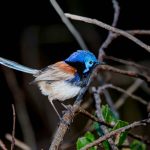
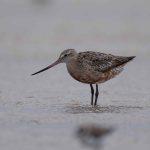
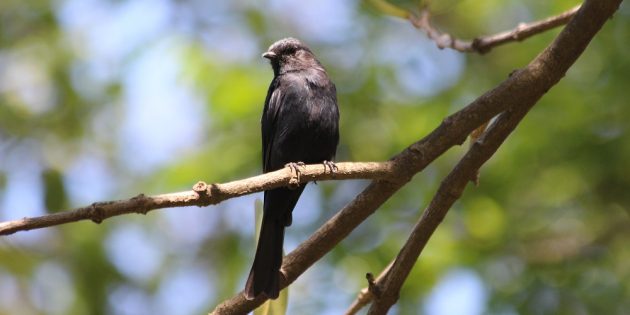

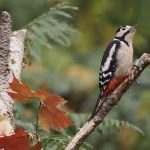
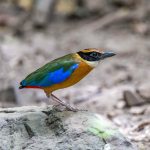
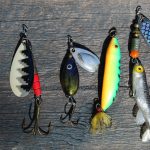
I have always used the long-o pronunciation. I think most birders I know personally pronounce it that way as well, but I have not done a poll. As a result the short-o pronunciation usually sounds a bit mannered to me.
As a non-native speaker I can assure you one thing: the hardest part about learning English is that there is no way of telling the pronounciation of a word by its spelling alonge, you have to hear someone say it. It therefore is quite amusing that even to native speakers, not everything is really clear.
At least we all agree that it doesn’t rhyme with mover.
Of similarly spelled words, I find 5 that use the short ‘o’: lover, hover, cover, glover, shover.
I found 7 that use the long ‘o’: clover, Dover, Grover, over, rover, drover, and stover.
However anyone pronounces it, if they announce they see a Mountain Plover I’ll come runnin’.
Ploohv-er… hadn’t thought of that one!
I’m still working on whether it’s nut-hatch or nu-thatch…
I can add nothing of clarity to this delightful exchange, but it’s spring, so my vagary will be drowned out by birdsong.
I grew up duckhunting the Napa-Sonoma Marsh from Vallejo during WWII under the tutelage of a father from Colorado; learning to read from a Mother of New England ancestry. Residents there came from all over America to work at the shipyards. I learned to identify the plover early and to say it as everyone else did, and not all were plover-lovers despite their rhyming. Not until I went to college, and met birders with books in their pockets, did I hear the name resonate through a snoot to rhyme with “o-ver.” Of course I was made to feel ignorant, as when the fourth grade teacher, a prim grammarian, stifled oral story-telling and made everyone hate English almost as much as math, by authoritative correction. Why is it so commonplace that one can expect to be separated from vital experience in order to pass for being educated? Having spent four decades as a poet and college professor, I’ve learned to listen to and appreciate the person speaking, and to delight in variations of every sort. I wonder if anyone who corrects the pronunciation of others is much interested in what they had to say and probably wouldn’t notice how unimpressed the bird is by their claim of authority. How about an annual calling contest to see who can lure a plover to alight upon their pointy head?
I came here because for the first time in my life I heard someone pronounce it ‘plohver’ (rhyming with ‘over’). I was so amazed by what sounded like an uneducated spelling pronunciation that I decided to look around the Internet for more information. You could blow me down with a feather. It seems to be a fairly widespread pronunciation. I don’t think I’ve ever heard anyone in Australia pronounce it ‘plohver’. Is it a North American thing?
I have always pronounced it like ‘lover’. Most of my American guests in Kejimkujik National Park in Nova Scotia used to pronounce it as ‘dover’. This amazed me to not end because it was so strange to me. I just assumed it was the accent. This summer I’ll be much more accepting to both ways since there seems to be no consensus on how to really pronounce it.
im a kiwi ( pron. keewee ). i was surprised to hear a friend refer to them as pluvvers as i had never prior heard anything but plo vers. but then he was born a czech, bought up as a pom, then married a kiwi and settled in nz. so who knows ?
Don’t feel bad: I’ve been speaking English since the day I was born, and I still didn’t know how to pronounce words like Kamehameha and Wagner and denatured for years. You have to hear them spoken.
“Middle English, from Anglo-Norman plover, pluvier, from Vulgar Latin *pluvi?rius : *plu-, probably imitative of plover cries (possibly influenced by Latin pluvia, rain (plovers being associated with rain in various later European traditions, because they were thought to be more active or easily caught in the rain, or because it was thought that they arrived with the rainy season); see PLUVIAL) + Latin -?rius, n. suff.] ” -American Heritage Dictionary
It seems the word is derivative of pluver or pluvier…suggesting it to be closer to short o or u (long u?). There is no evidence as to a long as in over. It seems “over” is mostly used in parts of New England and the Maritimes.
To sum it up in a single word – idiosyncracy! (see full reply above.)
How does one pronounce the word “plover”?
Do I rhyme it with over and clover?
Or should I say “plover,”
Like lover and cover?
I’ll just have to think this one over!
According to the etymology and Latinate historical roots, horribly, it may be the correct pronunciation is ploover! ( as in “il pluit”, it’s raining, in French, pronounced eel ploo-we). Someone made the comment as a joke, to rhyme with mover (haha) but we might ALL be wrong and he alone is correct. The horror!
To MAA to – To ma to,
Po TAA to – Po ta to!
Let’s call the whole thing off!